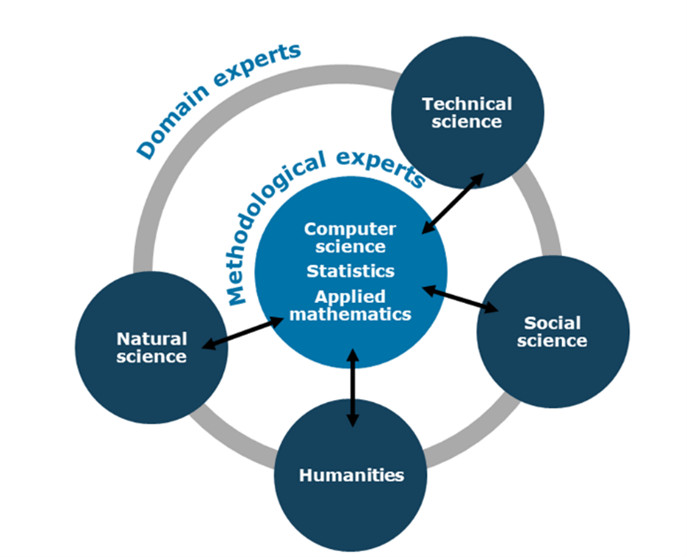


Compelling evidence shows that interdisciplinary research is markedly more effective at leading to groundbreaking results when compared to mono-disciplinary research.
The point of departure for the Villum Synergy programme lies in the research opportunities at the interface between the core data sciences (notably, computer science, statistics, and applied mathematics) and other disciplines. Indeed, continued advances in digitalisation, artificial intelligence, and the ensuing massive volumes of data call for interdisciplinary collaborations that combine methodological and technical expertise in data science with other scientific expertise in domain fields from the technical and natural sciences, the humanities and the social sciences.
This call is an opportunity to create excellent interdisciplinary research, by bringing together a team of research experts from different disciplines to work together on a joint research challenge.
The Villum Synergy programme has two grant types:
Villum Foundation is committed to diversity and focuses on equal opportunities throughout the assessment process and grant period (you may find our Gender Policy here).
We do not support
Health or veterinary research, i.e. research focused on the health of humans and animals, including nutrition, medicine, biomedicine, pharmacology and research within diagnostics and methods for examination and treatment.
Furthermore, applicants affiliated with departments whose main scientific focus is within these areas (including university health departments, hospitals, the Danish Cancer Society, DTU Health Tech and SDU Health Informatics and Technology) are not eligible to apply and will receive an administrative rejection.
Projects with a purely commercial focus are not supported.

To be considered an interdisciplinary project in the Villum Synergy call, the proposal should bring two separate research fields together (one of which is data science) to answer key questions that cannot be answered in the two fields separately. It is important that the research questions should bring value to both fields and that data science is not considered purely as a supporting tool.
Applications are assessed based on scientific excellence resulting from interdisciplinary collaboration. The assessment and selection process is divided into two steps.
Step 1: The applications are assessed by our scientific committee for Villum Synergy based on the Terms of reference (see below). The committee decides which applications should continue to step 2 and which applications should be rejected.
Step 2: Applications for full projects which proceed to step 2 are sent for external peer review and the applicants are invited for an interview with the scientific committee. After the interview the committee will recommend a number of full and initiation projects for funding. to the board of the Villum Foundation.
Unsuccessful applicants will have the opportunity to contact Head of Programme, Karen Skytte Larsen for feedback on their application.
Professor Anja Boisen, Department of Health Technology, DTU, board member, Villum Foundation, Denmark
Professor Christian S. Jensen, Department of Computer Science, Aalborg University, board member, Villum Foundation, Denmark
Professor Susana F. Huelga, Institute of Theoretical Physics, University of Ulm, Germany
Professor Bo Wahlberg, Division of Decision and Control Systems, KTH Royal Institute of Technology, Sweden
Professor Bert Meijer, Department of Chemical Engineering and Chemistry, Eindhoven University of Technology, The Netherlands
Professor Andreas Mayer, Department of Biochemistry, University of Lausanne, Switzerland
Michael Böhlen, Department of Informatics Database Technology, University of Zurich, Switzerland
Professor Mathias Drton, Department of Mathematics, Technical University of Munich, Germany
Professor Stine Lomborg, Department of Communication, University of Copenhagen, Denmark
The application must contain the following four documents:
The documents above must be submitted as four separate pdf files.
Q: Can a project involve two PIs from the same institution?
A: Yes, if one PI is a methodological expert from computer science, statistics or applied mathematics and the other a domain expert from a field of application that may be broadly chosen.
Q: Are senior PIs preferred?
A: No, there is no preference as to seniority if the PI is a permanent employee at a Danish university
Q: Is it possible to submit applications from the same department for an initiation grant as well as a full project grant?
A: Yes. However, an applicant can only be PI on one application
Q: Is it possible to apply for a Villum Synergy grant if you are already holding a grant from Villum Foundation?
A: Yes, your application will be evaluated on an equal footing with the other applications. However, it is important that the Synergy project adds new knowledge and is not just an extension of the current Villum project.
Q: Does Villum Foundation favour projects where the idea originates from the side of the domain expert or projects from the side of the methodological expert?
A: No
Q: Are Tenure-tracks included in ‘tenured employees’?
A: No